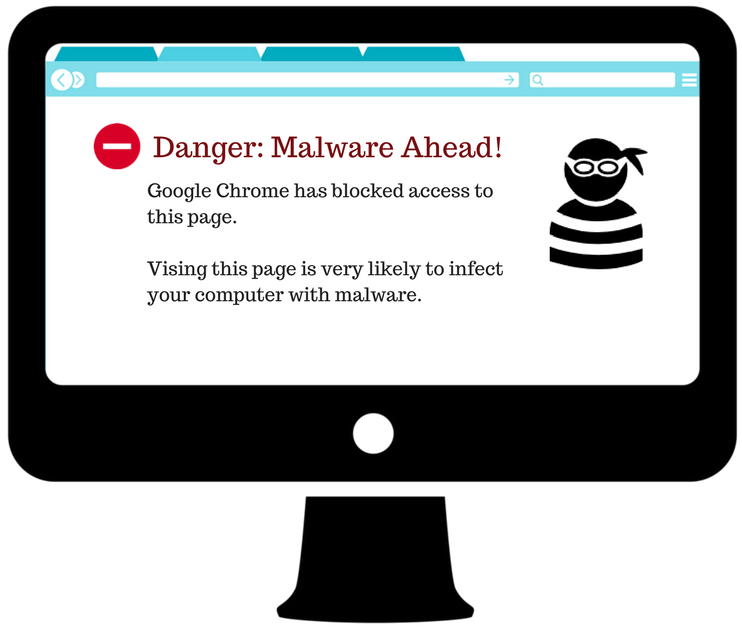
Web crawlers scan your website as soon as it goes live, and while some web crawlers are good for SEO purposes, others are not so well-intended. In the past year, cyber attacks made major headlines, including the infamous Yahoo breach. But the reality is that hacking is taking place every day and hackers aren’t always targeting huge websites. If you’re not currently protecting your website, you are putting yourself at risk for some unanticipated consequences. Once you’ve been hacked, there are several things that may happen:
Flagged for malware? Paid traffic is unable to reach your website
If your site has been plastered with the infamous “This site may harm your computer” warning, it means Google views your site as malicious and is trying to steer users from visiting your site. This is a good thing for the users – but probably not good for you and your website.
The flag means Google’s automated web crawler was attacked by viruses or spyware when it visited your website, or perhaps it interpreted your site as malicious because your outbound links redirect to sites that have also been flagged. As the saying goes, birds of a feather flock together – being associated with malicious activity is never a good thing.
Not only is your website’s reputation tarnished by the embarrassing warning sign but incoming traffic will also be affected, especially if you are currently running ads on your website. When a user visits your site and sees that it has been marked as “infected,” that user will likely not continue to explore your site. All paid traffic therefore is not reaching your site, ultimately costing you financial loss by nullifying your marketing efforts up to this point.
SEO damage
Damage to your SEO, or Search Engine Optimization, is another unwanted consequence of website infection. We can’t always rely on Google to let us know with a warning sign whether or not a website has been hacked. Ideally, you would want to clean up your website before Google discovers it since the cleanup process after you’ve been hacked can result in long-term SEO damage.
After Google’s crawlers index your link spam-infected pages, users finding your site through Google may see the spam content within the search results, long after you’ve already cleaned up your site. A hacked website not only means decreased search traffic, but also a drop in rankings. A case study has shown that sites hacked and penalized by Google suffer a long term penalty on their rankings. Manual cleanup for SEO damage might also be necessary, which can be an extremely lengthy process, often involving having to compile all your backlinks and then having to comb through each one to identify the bad ones to remove.
Banned ads account without warning
If your website has been hacked, another consequence involves your ads account (or accounts) being automatically suspended. There have been countless of cases where Google Adsense accounts have been removed without prior warning.
Users get email notifications about the sudden suspension, but the reasoning behind it is often ambiguous. With statements simply stating that the account has been suspended due to “invalid activity,” website owners are left feeling frustrated since there is virtually nothing they can do about it. Revoking a suspended account is also not possible until the probation period, typically 30 days, has passed. This can be detrimental to publishers who monetize mainly through serving Google ads on their sites.
Conclusion
While there are numerous ways in which a hacking incident can affect your website in more obvious ways such as web defacement or even unauthorized creation of new users, you often don’t hear about the less direct consequences – until you become a victim yourself. These include not being able to capture all of your paid traffic, getting penalized in search rankings and other SEO damages, or getting your ad accounts suspended. While it’s easy to think that you can speedily recover from a hack, the reality is these consequences can often cause long-term damages which are difficult to fix right away.
Website security is something that is often overlooked by website owners but no matter how big or small your website is, the possibility of getting hacked is real so preventive measures are necessary. Remember, web security doesn’t have to be hard, so if you’re interested in protecting your site, check out Cloudbric’s service and see how you can get started.





